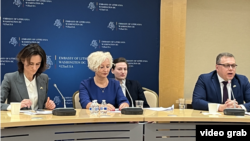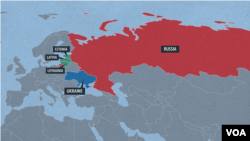Speakers from the Baltic states voiced solidarity with Ukraine amid Russian aggression and said continued U.S. support for Ukraine holds significant implications for the Indo-Pacific region.
This week, parliamentary speakers from Latvia, Lithuania and Estonia visited Washington, holding talks with U.S. lawmakers, including House of Representatives Speaker Mike Johnson, and officials from the State Department.
On the social media platform X, Johnson said he discussed "ongoing challenges" and "the importance of deterring threats like China, Russia, and Iran" during his meeting with Baltic parliamentary speakers earlier this week.
The talks came amid U.S. congressional debate on new aid for Ukraine. Ukraine is dependent on support from its Western allies, especially the United States, to fight back against Russia's invasion, now approaching the two-year mark.
"It seems that they [Russians] are really preparing themselves for a long-time war," said Lauri Hussar, president of the Riigikogu, Estonia's single-chamber legislature.
Hussar said during a press briefing on Wednesday that it is "extremely important" to continue support for Ukraine as Russia gears up for a prolonged conflict by bolstering its wartime economy and military structure.
Estonia has contributed more than $434 million in military aid to Ukraine, amounting to 1.4% of its gross domestic product, with a commitment to allocate 0.25% of its GDP annually for the next four years, according to Hussar.
Additionally, the Riigikogu is exploring the use of frozen Russian assets for Ukraine's rebuilding and advocating that Russia compensate Ukraine for its aggression.
Lithuanian official notes conflict's significance
Viktorija Cmilyte-Nielsen, speaker of Lithuania's Seimas (parliament), highlighted the global significance of the conflict in Ukraine, particularly for the Indo-Pacific region and Taiwan.
She said international response from the West, particularly the United States, to support "a victim of a brutal aggression" is under close watch, because inadequate support of Ukraine could diminish global trust in the West.
"Autocratic regimes, or perhaps countries that are considering undertaking aggressive measures, can also act upon that" if they see the support for Ukraine is not strong enough, Cmilyte-Nielsen told reporters during a press conference on Wednesday.
"On the case of Lithuania, we have been subjected to coercive measures by China after our decision to develop our cooperation with democracies in the Pacific, specifically with Taiwan," she added.
China claims sovereignty over Taiwan and vows to bring the self-governed democracy under Beijing's control by force if necessary.
In 2021, Lithuania became the first European country to allow Taiwan to open an office in its capital with the name of "Taiwanese Representative Office in Lithuania." Other nations often designate such offices with the name "Taipei Representative Office" or "Taipei Economic and Cultural Representative Office" to avoid offending China, which claims Taiwan as part of its territory.
On Wednesday, China's new defense chief, Dong Jun, urged closer military ties with Russia in a video talk with his counterpart, Russian defense minister Sergei Shoygu.
Dong told Shoigu that militaries from the two nations will "promote bilateral military relations to reach an even higher level, in order to play an even bigger role in upholding global security and stability," according to a readout from the Chinese Defense Ministry.
Russian attack injures 4, says Ukraine
Ukrainian officials said Wednesday a Russian aerial attack on a hospital in the Kharkiv region had injured four people.
Oleh Synehubov, regional governor of Kharkiv, said the attack happened late Wednesday in the town of Velykyi Burluk, located east of the city of Kharkiv and about 20 kilometers (12.4 miles) from the Russian border.
Synehubov said guided aerial bombs hit the hospital, damaging its façade, windows and roof.
He added that 38 people were evacuated, and that both staff and patients had time to respond to air alerts before the strike.
The Russian Defense Ministry reported downing five Ukrainian drones late Wednesday.
The ministry said it destroyed four of the drones over the Belgorod region, which borders Ukraine, and one other drone in the neighboring Kursk region.
There were no reports of damage or injuries.
Some information for this report came from Reuters.






